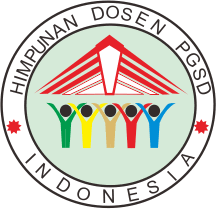Efektivitas pembelajaran daring dalam keterampilan membaca kreatif kelas v sekolah dasar
Abstract
The purpose of this study was to determine the effectiveness of online learning on creative reading skills in fifth grade students of Menganti Elementary School, Sruweng District, Kebumen Regency. This research is a quantitative research. The research was conducted with one test. The research subjects were the fifth grade students of the Menganti State Elementary School, totaling 27 students. The data source came from students. Data collection techniques used questionnaires and multiple choice tests. The data validity and analysis the normality uses the person product moment through the SPSS 20.0 for windows application using the one-sample Kolmogorov-Smirnov technique. This research uses the approach applied is the Pre-experimental One Shot Case Study. The results showed that based on the Paired T-Test in the SPSS 20.0 application, the significance value (2-talled) of 0.061> 0.05 indicated that there was no significant difference between the results of the initial test scores and the results of the final test scores. This shows that there is no significant effect on the difference in treatment given to each variable. The conclusion of this study is that there is no effect on the effectiveness of online learning on the writing skills of fifth grade students at Menganti State Elementary School, Sruweng District, Kebumen Regency.
Keywords
Full Text:
PDFReferences
V. Mirahwati 2019 Manfaat E-Learning Modul 13 (Jakarta: Universitas Mercu Buana) [2] Abdul Jabar 2020 Pembelajaran Daring Pada Materi Program Linear PGRI Banjarmasin [3] H. Khatimi 2006 Mengenal E-Learning Sebagai Salah Satu Bentuk Kegiatan Pembelajaran Info Tek., 7(2) 72-81 [4] R. Etviana, J. I. S. Poerwanti, and S. Wahyuningsih 2020 Studi komparasi model mind mapping dan think pair share terhadap keterampilan berpikir kreatif ditinjau dari minat membaca siswa kelas IV sekolah dasar Didakt. Dwija Indria 3(2) [5] S. Y. Slamet 2007 Dasar-Dasar Keterampilan Berbahasa Indonesia. (Surakarta: UNS Press) [6] D. Ramadhanti and T. Budiharto 2017 Penggunaan Model Cooperative Script untuk Meningkatkan Keterampilan Membaca Pemahaman pada Siswa Kelas V di Sekolah Dasar J. Didakt. Dwija Indria., 3(12) [7] S. Notoatmodjo 2003 Metodelogi Penelitian Kualitatif dan Kuantitatif. (Jakarta: PT. Rineka Cipta) [8] S. Margono 2007 Metodologi Penelitan Pendidikan. (Jakarta: Rineka Cipta) [9] Sugiyono 2014 Metode Penelitian Kuantitatif, Kualitatif, dan R&D. (Bandung: Alfabeta) [10] Mishadin 2012 Efektivitas Media Pembelajaran Berbasis Komputer pada Mata Pelajaran Elektronika terhadap Prestasi Belajar Siswa Kelas XI di SMK 1 Sedayu Bantul Universtas Negeri Yogyakarta [11] N. Fitrianti and J. I. S. Purwanti 2021 Studi Korelasi antara Gaya Belajar dan Kebiasaan Membaca dengan Kemampuan Berpikir Kritis dalam Pembelajaran IPS di Sekolah Dasar Didakt. Dwija Indria 9(4) [12] T. H.G 2015Membaca Sebagai Suatu Keterampilan Berbahasa. (Bandung: Angkasa) [13] D. Patiung 2016 Membaca Sebagai Sumber Pengembangan Intelektual Al Daulah J. Huk. Pidana dan Ketatanegaraan, 5(2) 352-376 [14] D. Darmawan 2013 Metode Penelitian Kuantitatif. (Bandung: PT. Remaja Rosdakarya) [15] S. Arikunto 2019 Teknik Pengumpulan Data. (Jakarta: PT. Rineka Cipta) [16] W. Herman J 2002 Instrumen Penelitian (Jakarta: Gramedia) [17] S. P, 2017 Uji Validitas dan Reliabilitas (Flores: Nusa Indah) [18] Suparno dan Muhammad Yunus 2008 Uji Validitas dan Reliabilitas. (Jakarta: Universitas Terbuka)
Refbacks
- There are currently no refbacks.



